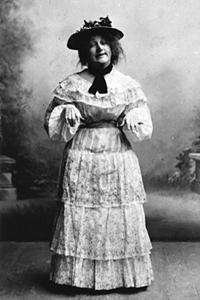Anna Hofman-Uddgren
Anna Maria Viktoria Hofman-Uddgren ( 23 February 1868 – 1 June 1947) née Hammarström; also known as Hoffman and Hofmann, was a Swedish actress, cabaret singer, music hall and revue artist, theatre director, and film director. Until 2016, she was considered the first woman to become a film director in Sweden.[1][2]


Life
Anna Hofman-Uddgren was born in Hedvig Eleonora parish on Östermalm in Stockholm, Sweden. She was the daughter of Emma Hammarström (1849–1910) and was alleged to have been the illegitimate daughter of King Oscar II of Sweden. This was a often-repeated rumor in Stockholm at the time. The French artist Cléo de Mérode, who was engaged as a guest artist by Hofman-Uddgren, referred to these rumors: "It was said of her that she was the natural daughter of King Oscar, which is possible as she had a noted confidence."[1] This rumor was never confirmed, however: as Anna Hofman-Uddgren banned the press from mentioning any biographical information about her, an instruction that was respected by the press despite the fact that this was common practice to do about artists in the press.[1][3]
In her unpublished memoirs, Hofman-Uddgren stated that during her upbringing she was taken to Stockholm Palace by her mother, where she was introduced in private to the king, and that he asked her if there was anything he could do for her. When she was seventeen, Oscar II financed a trip to Paris, where she remained for eight years, studying the French language and singing. She debuted as a singer in charity concerts in Paris and participated in the artistic life there.[1]
In 1892, Hofman-Uddgren returned to Stockholm, where she debuted as a chanteuse at Stockholms Tivoli, an amusement park on the island of Djurgården in Stockholm, where she became a popular artist with her French repertoire of songs. At the end of the nineteenth century, Anna Hofman-Uddgren assumed management of the popular open-air theater, Kristallsalongen on Djurgården, where she also served as director. The theater business ceased in 1924.[4]
She debuted as a film director as well as a film actress in the silent film Stockholmsfrestelser (1911). She also directed the films of two plays by August Strindberg, Fadren (1912) and Fröken Julie (1912).[5]
Personal life
She married screenwriter, poet, journalist, and author Karl Gustaf Uddgren (1865–1927) in 1900 and they had six children: five daughters and one son. Her daughter, actress and theatre director Alice Eklund (1896–1983), married actor Ernst Eklund (1882–1971). Anna Hofmann-Uddgren died in Bromma and was buried at Skogskyrkogården in Stockholm.[6] Her grandchildren included actress Öllegård Wellton (1932–1991).[7]
See also
- Ebba Lindkvist - later identified as the first woman to become a film director in Sweden
References
- Marika V. Lagercrantz (2009). "En oavslutad berättelse. Om varietéstjärnan Anna Hofmann". Kulturellt: Reflektioner i Erling Bjurströms anda.
- Marina Dahlquist (24 February 2017). "Anna Maria Hammarström". Women Film Pioneers Project. Retrieved 1 April 2019.
- "Anna Hofman-Uddgren". Nordic Women in Film. Retrieved 1 May 2020.
- "Anna Maria Viktoria Hofman-Uddgren f. Hammarström". bygdeband.se. Retrieved 1 April 2019.
- "Stockholmsfrestelser eller Ett Norrlands-herrskaps äventyr i den Sköna synderskans stad (1911)". Swedish Film Institute. Retrieved 1 April 2019.
- "Alice Eklund". nordicwomeninfilm.com. Retrieved 1 April 2019.
- "Karl Gustaf Uddgren". Vem är det : Svensk biografisk handbok. 1925. Retrieved 1 April 2019.
| Wikimedia Commons has media related to Anna Hofman-Uddgren. |